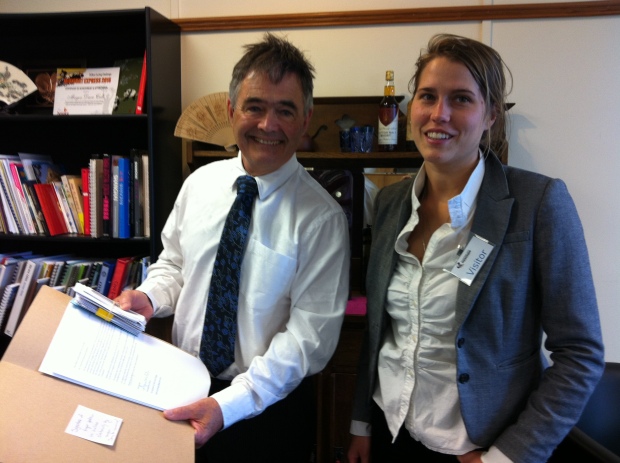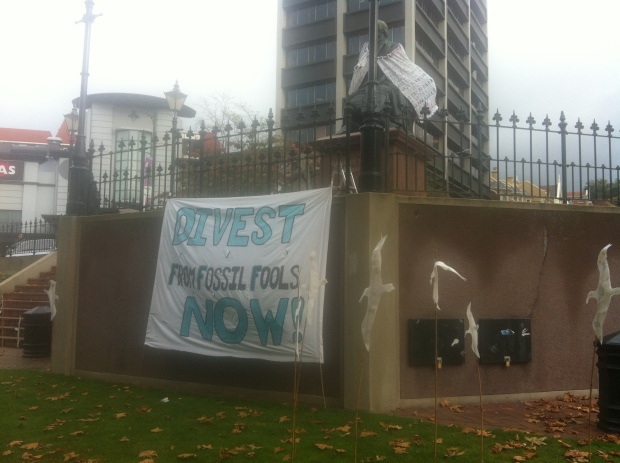Dunedin Divests!
Over 300 divestment submissions were received in response to the Dunedin City Council’s Annual Plan. The council voted in May 2014 to write legislation for socially responsible investment plans that would divest from fossil fuels extraction, tobacco, gambling, armaments, and pornography. The vote to draft legislation was successful, but the real vote didn’t happen until 29 April 2015.
On voting day, Oil Free Otago delivered over 100 postcards and a petition with around 700 signatures telling the DCC that the people of Dunedin support their initiative to divest.
It was a very close vote of 8-7 in favour of divesting from fossil fuel extraction. Dunedin City Council has adopted a socially responsible investment statement that divests not only from fossil fuel extraction, arms, gambling, pornography, and tobacco.
Who’s next?
Over the last year (2014-2015) professors, students and alumni have asked the University of Otago to divest from fossil fuel extraction. They’ve even got a petition. Like there page on Facebook. Contact for updates or to get involved: OtagoUniDivests@gmail.com
June 2015: The University of Otago Foundation Trust divests from fossil fuel exploration and extraction. The University of Otago Council have yet to vote to divest.
Additionally, the University of Auckland and University of Canterbury have petitions asking their University Councils and associated Trusts to divest from fossil fuels.
What is divestment?
Divestment is the opposite of an investment – it simply means getting rid of stocks, bonds, or investment funds that are unethical or morally ambiguous.
Why divest?
When you invest your money, you might buy stocks, bonds, or other investments that generate income for you. Cities, universities, religious organizations, retirement funds, and other institutions put billions in these same kinds of investments to generate income to help them run. Fossil fuel investments are a risk for both investors and the planet, so we’re calling on institutions to divest from these companies.
Fossil fuel divestment takes the fossil fuel industry to task for its culpability in the climate crisis. By naming this industry’s singularly destructive influence — and by highlighting the moral dimensions of climate change — we hope that the fossil fuel divestment movement can help break the hold that the fossil fuel industry has on our economy and our governments.
Who’s already divested?
Victoria University
Anglican Church of Aotearoa
Christchurch City Council
Tertiary Education Union
More than 30 cities worldwide among hundreds of other universities and organizations. Check the full list at:
http://gofossilfree.org/commitments/
Is divestment common?
There have been a handful of successful divestment campaigns in recent history, including those targeting violence in Darfur, tobacco advertising, and others, but the largest and most impactful one came to a head around the issue of South African Apartheid. By the mid-1980s, 155 campuses – including some of the most famous in the country – had divested from companies doing business in South Africa. 26 state governments, 22 counties, and 90 cities, including some of the nation’s biggest, took their money from multinationals that did business in the country. The South African divestment campaign helped break the back of the Apartheid government and usher in an era of democracy and equality.
Want to do more?
- Divest! Consider switching your KiwiSaver, your assets and daily banking to a bank that allows ethical investing.
- Tell Westpac to stop financing Bathurst Resources and their plans for coal mining on the Denniston Plateau.
- Send an email to the CEO of the NZ Super Fund asking them to divest.
- Write a letter to Minister for Energy and Resources Simon Bridges telling him to stop government subsidies for fossil fuel companies.
Want to start a divestment conversation at your local organisation or church?
Contact us: oilfreeotago@gmail.com


